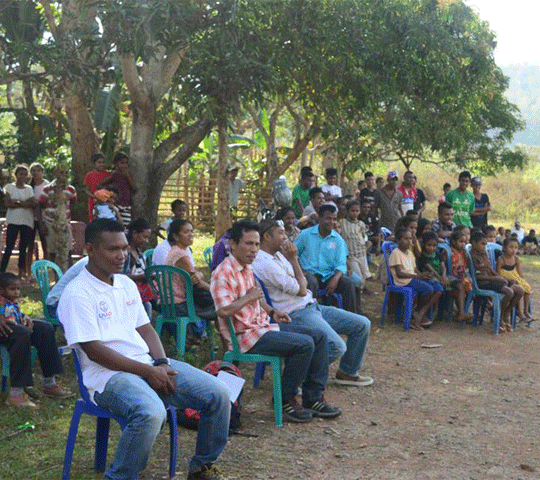Despite ongoing efforts to strengthen gender equality, Timor-Leste’s patriarchal culture continues to limit women’s access to equal and accessible education, health services, job opportunities, and justice. Efforts to educate communities on gender equality and women’s rights are critical to promoting positive social change.
Counterpart has implemented the USAID/Timor-Leste NGO Advocacy for Good Governance Activity since 2020, with gender equality and women’s empowerment a central piece of our efforts. The project engages the gender and human resources leads across nine civil society partner organizations to strengthen their capacity to address their organizations’ gender and social inclusion needs and priorities. Through training, mentoring, and coaching, the Activity enhances the NGO staff’s awareness and skills to develop and operationalize inclusive human resources practices, in their recruitment and hiring practices and their institutional policies. The Activity’s commitment to fostering inclusion—both internally and among the NGO partners—extends beyond the concept of gender and incorporates inclusion more broadly, addressing a wide spectrum of biases and stereotypes.
In 2023 alone, Counterpart held 126 sessions for 1,280 people focused specifically on women’s empowerment and social inclusion efforts. When women feel empowered, they become agents of change who can shape a better future for their community.

Joao Fernandes Soares, Counterpart’s gender, equity, and social inclusion and advocacy manager, leading an Unconscious Bias training for FONGTIL staff in October, 2024.
FONGTIL Institutionalizes GESI Learning into Organizational Practices
Alicia Rodrigues Araujo, 27, serves as the administrative and human resources manager at Forum NGO Timor-Leste (FONGTIL), an umbrella organization of non-governmental organizations. As part of her role, Araujo also serves as FONGTIL’s gender equality and social inclusion (GESI) focal point, working closely with the team to ensure inclusive practices.
Under Araujo’s guidance, FONGTIL has achieved significant success instituting changes in its implementation of GESI practices. As Araujo shared, “before partnering with the Activity, FONGTIL and its staff members had limited knowledge and awareness of the importance of GESI principles. This led to a lack of consideration for GESI integration into our programming and organizational practices.”
Traditionally, FONGTIL faced challenges in recruiting diverse talent, designing programs that addressed gender disparities, and creating an inclusive office environment where everyone felt valued and respected. Eager to improve these practices, FONGTIL seized opportunities for its staff to participate in GESI training and capacity strengthening initiatives on topics including preventing gender-based violence, inclusive leadership, unconscious bias, and preventing sexual exploitation, abuse, and harassment.
Counterpart’s training, mentoring, and coaching has shaped FONGTIL’s organizational approach to inclusive recruitment practices and sensitively designing programs and operations aligned with GESI principles. The team facilitated continuous learning and capacity strengthening opportunities through quarterly learning events and is in the process of formalizing a GESI community of practice, ensuring that GESI focal points like Araujo could share practical tips and tools with staff at their respective organizations.
Reflecting on the training Araujo noted, “the GESI training expanded our understanding of the importance of inclusivity in all aspects of our work. It highlighted the need for gender-sensitive program designs and gender-sensitive office spaces, including unbiased recruitment processes. We reviewed our recruitment strategies and ensured that job descriptions were inclusive, actively seeking diverse candidates and minimizing bias. In our office, we made changes such as widening doors and making toilets accessible for people with disabilities and fostering a culture of respect and inclusion through training and awareness raising. A more inclusive office environment has been noted by staff, resulting in improved morale, reduced conflicts, and greater collaboration across teams.”
With help from USAID and Counterpart, FONGTIL is committed to sustaining and expanding its GESI practices. This partnership exemplifies the shared commitment to advancing and promoting inclusive practices in Timor-Leste.





